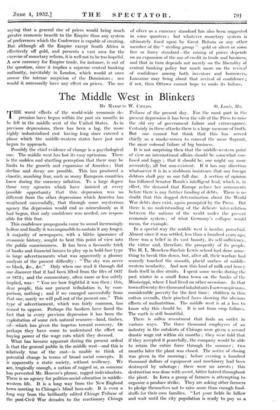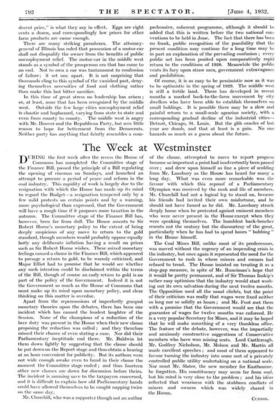The Middle West in Blinkers
Trim worst effects of the world-wide economic de-
pression have begun within the past six months to be felt in the middle west of the United States. As in previous depressions, there has been a lag, the more highly industrialized cast having long since entered a phase which the middle-western states have just now begun to approach.
Possibly the chief evidence of change is a psychological one. The middle west has lost its easy optimism. There is the sudden and startling perception that there may be limits to the growth and expansion of America ; that decline and decay are possible. This has produced a chaotic, numbing fear, such as many European countries knew during the currency inflation. To a large degree those very agencies which have insisted at every possible opportunity that this depression was no different from the other depressions which America has weathered successfully, that through some mysterious agency the depression would end as miraculously as it had begun, that only confidence was needed, arc respon- sible for this fear.
This confidence propaganda came to sound increasingly hollow and finally it was impossible to sustain it any longer. A majority of newspapers, with a blithe ignorance of economic history, sought to beat this point of view into the public consciousness. It has been a favourite trick of banks and financial houses to play up in bold face type in large advertisements what was apparently a gloomy analysis of the present difficulty : " The sky was never so black, &c., &c." Only when one read it through did one discover that it had been lifted from the files of 1857 or 1873 ; and the commentary, often more or less subtly implied, was : " You see how frightful it was then ; this, dear people, this our present tribulation is, by com- parison, nothing ; and if we emerged successfully from that one, surely we will pull out of the present one." This type of advertisement, which was fairly common, has ceased to appear. Perhaps the bankers have faced the fact that in every previous depression it has been the exploitation of some rich natural resource—land, timber, oil—which has given the impetus toward recovery. Or perhaps they have come to understand the effect on buying power of the wage cuts which they decreed.
What has become apparent during the present ordeal is that the general public in the middle west—and this is relatively true of the cast—is unable to think of potential change in terms of broad social concepts. It is apparently a static society, without resiliency. We are, tragically enough, a nation of rugged or, as someone has perverted Mr. Hoover's phrase, ragged individualists. There is no agency for politico-social education in middle- western life. It is a long way from the New England town meeting to Chicago's blind boss-rule. It is even a long way from the brilliantly edited Chicago Tribune of the post-Civil War decades to the reactionary Chicago
Tribune of the present day. For the most part in the present depression it has been the nib, of the Press to raise the old cry of government failure and extravagance. Certainly in these attacks there is a large measure of truth. But one cannot but think that this has served chiefly as a smoke-screen to conceal the more flagrant, the more colossal failure of big business.
It is not surprising then that the middle-western point of view on international affairs should be somewhat con- fused and foggy ; that it should be, one might say more accurately, all but non-existent. If it has any direction whatsoever it is in a stubborn insistence that our foreign debtors shall pay us our full due. A section of opinion has followed Senator Borah's intelligent lead, which is, in effect, the demand that Europe reduce her armaments before there is any further funding of debts. There is no doubt that this dogged determination about the World War debts does exist, again prompted by the Press. But there is no understanding of the delicate inter-relation between the nations of the world under the present economic system ; of what Germany's collapse would mean, for example.
In a special way the middle west is insular, parochial. Almost since it was settled, less than a hundred years ago, there was a belief in its vast bounty, its self-sufficiency, the virtue and, therefore, the prosperity of its people. The H. L. Meneken-Sinclair Lewis school had done some- thing to break this down, but, after all, their warfare had scarcely touched the smooth, placid surface of middle- western insularity. And now this land of milk and honey finds itself in dire straits. I spent some weeks during the past winter in a small Iowa town on the banks of the Mississippi, where I had lived on other occasions. In that townof twenty-five thousand inhabitants I saw conspicuous, considerable poverty for the first time: chiklren in thin cotton overalls, their pinched faces showing the obvious effects of malnutrition. The middle west is at a loss to know why this should be. It is not from crop failures. The earth is still bountiful.
There is sullen resentment that finds an outlet in Various ways. The three thousand employees of an industry in the outskirts of Chicago were given a second drastic wage cut within six months ; they were told that if they accepted it peacefully, the company would be able to retain the entire force through the summer ; two months later the plant was closed. The notice of closing was given in the morning ; before evening a hundred thousand dollars of equipment and machinery had been destroyed by sabotage ; there were no arrests ; this destruction was done with secret, bitter hatred throughout the plant. In Iowa a group of farmers is attempting to organize a produce strike. They are asking other farmers to pledge themselves not to raise more than enough food- stuffs for their.own families. "Let your fields lie fallow and wait until the city population is ready to pay us a





































 Previous page
Previous page